
The Best of Everything
Encyclopedia Entry • Films Main
Montana Moon
1930

Critics' Reviews • Our Reviews • Movie Posters • Lobby Cards • Misc. Images
Click here to see photos from the film.
US release: 3/20/30. DVD on-demand release, Warner Archives: 3/4/14. Cast: Joan Crawford (as "Joan Prescott"), Johnny Mack Brown, Dorothy Sebastian, Ricardo Cortez, Benny Rubin, Cliff Edwards, Karl Dane, Lloyd Ingraham. Credits: Story and Screenplay: Sylvia Thalberg, Frank Butler. Dialogue: Joe Farnham. Director: Malcolm St. Clair. Camera: William Daniels. Music and Lyrics: Nacio Herb Brown and Arthur Freed. Editors: Carl L. Pierson, Leslie F. Wildier. Plot Summary: Joan Crawford and Johnny Mack Brown star in this high budget horse opera from M-G-M. She is Joan Prescott, a spoiled debutante en route to the family ranch in Montana and he is the cowboy she meets and marries after impulsively departing the train at a whistle stop. Surprising everyone, Papa Prescott (Lloyd Ingraham) is only too willing to welcome Larry Carrigan (Mack Brown) into the family, Larry being exactly the opposite of the slick society swells that Joan usually dates. But our Joan just can't help cutting the rug with old beau Jeff Pelham (Ricardo Cortez) and a jealous Larry slugs him. An angry Joan hops the next train back to New York but suddenly finds herself a victim of a gang of outlaws. A gang that seems mighty familiar! Co-written by executive producer Irving Thalberg's sister Sylvia, Montana Moon comes complete with songs by house composers Arthur Freed, Nacio Herb Brown and Herbert Stothart, including "The Moon is Low", "Happy Cowboy" and "Let Me Give You Love". ~ Hans J. Wollstein, All Movie Guide |
Mordaunt Hall in the New York Times April 14, 1930 An interminable, amateurish talking picture, with spasmodic snatches of melody, is now sojourning at the Capitol. It is known as "Montana Moon" and it has a musical comedy plot that most of the time takes itself only too seriously. There is little or no idea of sound perspective in its recording, and when Joan Crawford sings her vocal efforts are equally loud, whether she is in the foreground or on a distant edge of the Montana cowboys' camp. Two or three times it seems as though the story is about to give up the ghost, but at these junctures there suddenly comes what is supposed to be a dramatic episode and the tale goes on with renewed energy. It is a production that is equipped with poor dialogue and also one that is frequently lacking in good taste. Malcolm St. Clair, whose work on silent films won for him considerable distinction, is responsible for the direction of this current offering, the script of which was supplied by Sylvia Thalberg and Frank Butler, with interpolations by Clifford Grey and Herbert Strothart. Nacio Herb Brown and Arthur Freed are credited with the music and lyics. Those in the upper reaches of the theatre yesterday afternoon applauded and laughed at some of the incidents. On at least one occasion derisive mirth was aroused by the actions of Joan, the heiress impersonated by Miss Crawford, and when Larry, the handsome cowboy from Texas, decides to stay in Montana and permit Joan, his bride, to go on her wild way to New York, the audience evidently took this to be a happy ending, for at least the deserving Larry. But the authors will that Larry and Joan must not be parted and the train is held up by cow-punchers masquerading as bandits. When Joan is carried away in the arms of a man who talks with a Mexican accent and whose face is concealed by a black kerchief, she is well aware that the supposed desperado is none other than her husband, who, at the last moment, experiences a change of heart. Joan's conduct is a source of much concern to her father, Mr. Prescott, owner of the largest ranch in Montana. In one of her reckless moods, she leaves the train on which she is traveling and makes up her mind to return to New York. During the wait for the Eastern express, she wanders about until she comes to Larry's camp and soon she forgets all about trains and New York. A few fadeouts and flashes of ranch life and Joan becomes Larry's bride, much to her father's satisfaction. At one of those boisterous parties, to which certain film makers are partial, Joan enrages her husband. At this gathering, Larry appears in his cowboy garb, but, subsequently, he is rigged up in a dress suit, looking extremely uncomfortable. All might have gone well with this knight of the plains had not Joan demonstrated a liking for Jeffrey, played by Ricardo Cortez, who, with Joan, gives a zealous exhibition of the tango, winding up the dance with a kiss. Larry resents this by striking Jeffrey and a good many of those in the theatre applauded the cowboy's punch. One gathered that both Jeffrey and Joan were unpopular with the Capitol spectators. But where there's a will there's a way and, without consideration for the speed of trains and such like, the miracle workers take great delight in showing that Joan loved her humble Larry in spite of his uncouth ideas. Nevertheless, one leaves the film fairly certain that it will not be long before Larry and Joan are in the throes of another disagreement. Taking it all in all, the most pleasing features of this production are Miss Crawford's camel's hair coat and her jodhpur riding outfit. The comedians, Benny Rubin and Cliff Edwards, do their bit to atone for some of the snarling, but their lines are none too witty. Miss Crawford appears to enjoy her rôle and sometimes her acting is quite fair. Mr. Brown gives a good performance. Lloyd Ingraham also does well as Prescott. Mr. Cortez, once the interpreter of heroic rôles, in this picture acts the part of the scamp, Jeffrey. His work is not impressive. Benny Davis is the star of the stage offering. His singing is hardly enjoyable. One feels that one ought to be rewarded by a good picture for having listened to him.
Elizabeth Yeaman in the Hollywood Daily Citizen May 2, 1930 Montana Moon, the
picture which opened at the Egyptian Theater yesterday, might just as
well have been called The Great Divide, except for the fact that
Warners released a picture by that title several months ago. There is
the super-sophisticated young city flapper who goes west to her
father's ranch and falls for a great big, rustic cowboy. And there is
the great conflict between the artificiality of her city-bred luxury
and the "call of the wild," but pride overrules her love until she is
kidnapped by the virile son of nature, and you know she will just adore
being tamed by him out in those wilds where a bath is something you
seldom even hear about. Joan Crawford and Johnny Mack Brown are
starred in this picture, and in justice to the handsome Johnny, he
gives a good portrayal of the hackneyed role that has been handed out
to him. He is, in fact, so delightfully engaging that you can
understand how almost any girl will become ga-ga in his presence, even
if he is forced to appear as an incoherent actor in a melodrama. ROLE UNSYMPATHETIC For that matter, Joan does some good acting, but her selfish, hoydenish
role is not a sympathetic one. The wardrobe department failed miserably
in giving her becoming clothes, and in the effort to emphasize feminine
appeal, her attire revealed lines that are neither graceful nor
seductive. An attempt to analyze Miss Crawford's popularity frankly
baffles me. She does have an over-abundance of that vivacity called
"pep" but she lacks the innate glow of vitality, which is so striking
in Ruth Chatterton or Mona Maris, or Clara Bow, to name three sharply
contrasting types. She gives the impression of being artificially
stimulated, as though she might be a little anemic, and was continually
forcing herself into unnatural animation. The cowboys who brought
comedy relief were played by Ricardo Cortez, Benny Rubin, Cliff Edwards
and Karl Dane. There were also a number of mass cowboy scenes with some
very pretty music. Even if Cowboys don't usually go in for close
harmony, it was highly entertaining. Lloyd Ingraham took the part of
the father, and Dorothy Sebastian was cast as Elizabeth. PLOT NOT ORIGINAL Frankly, Montana Moon probably will appeal to those effete Easterners
whose conception of cowboys has been based on an experience at a dude
ranch. But we must concede some artistic license in making a cow
puncher attractive. What is most amazing, is the fact that out of all
the writers who have come to Hollywood from all over the world, no one
seems to be able to think up a new plot for a western. Malcolm St.
Clair directed the picture, and Sylvia Thalberg and Frank Butler wrote
the story and continuity with dialogue by Joe Farnham. The songs were
composed by Nacio Herb Brown and Arthur Freed. Fanchon and Marco's "Goodfellows" Idea featured Lucille Page, acrobatic dancer and a men's ballet. A current newsreel completed the bill.
Los Angeles Record (anonymous reviewer) April 3, 1930 Joan Crawford follows the popular tastes and goes west in her latest picture Montana Moon, which opens at Lowe's State today. Her character, however, is that of a New York society debutante who
travels to one of her father's western ranches in a private car,
seeking adventure and finding it in the arms of a handsome cowboy. A whirlwind marriage ensues and the complications start. The cowboy has
old-fashioned ideas about the conduct of married women and objects to
her friends. The debutante can't see things that way, and only becomes
more daring than ever. John Mack Brown and Dorothy Sebastian, both
of whom were featured with Miss Crawford in Our Dancing Daughters, head
the cast of supporting players. Ricardo Cortez makes his return to the
screen as the society heavy. Benny Rubin and Ukelele Ike are comical
cow hands. Karl Dane and Lloyd Ingraham complete the cast. Leo the
Lion, the original of the MGM trade mark, is appearing and performing in
person at the theater entrance all this week, at 11 a.m., 4 p.m., and 6
p.m. daily. Fanchon and Marcos stage idea is Bells and Belles, Georgie Stoll leads the band.
Harrison Carroll in the Los Angeles Evening Herald April 4, 1930 Star Plays New York Society Girl
The untrammeled younger set follow Horace Greeley's advice in Montana
Moon, Joan Crawford's latest starring vehicle now showing at Loew's
State. By special train they invade the cow-country, bringing their
easy kisses, cock-tails, slinking gowns and blasé wise-cracks to
disturb the peace of Millionaire Prescott's Montana ranch, and
particularly that of Larry, a slim and dark young range-rider who
originated down in Texas and has, as the heroine put it, an accent so
thick that you can't cut it with a knife. HEROINE IS WILLFUL Joan Crawford plays one of the Prescott girls, a head-strong woman who
has had her way since babyhood and who lives precipitately, even to
marrying the cowboy whom she meets in the desert night as she secretly
departs from the special train to escape the attentions of a slick
young man whom her sister loves. Miss Crawford's interpretation is a
spirited one, and should fine favor. Johnny Mack Brown plays the cowboy and his slow drawl elicited audible appreciation from the feminine portion of the audience. In addition, there are Dorothy Sebastian, always appealing, as the
sister; Ricardo Cortez as the patent-leather lover, Jeff; Lloyd
Ingraham as the irate but helpless Pater Prescott; Benny Rubin as a
patent medicine man from New York; and Cliff Edwards as Tex, an amiable
dunce and cowboy cut-up. EDWARDS SCORES Edwards is responsible
for some of the most spontaneous fun making in the picture, and
introduces as well a really melodious theme song, "Montana Moon." Some of the photography and recording in Montana Moon deserves superlatives, and the cowboy choruses are stirring. In addition to the western feature, Loew's State has a Hearst Metrotone
news reel with some of the most striking shots ever filmed of a
formation of airplanes in flight.
Winifred Aydelotte in the Los Angeles Record April 4, 1930
It is almost necessary to let out a real cowboy 'whooeeee' of delight
after seeing Montana Moon, which opened yesterday at Loew's State. It's
a larrupin' picture.
Minus hard riding, falls, cattle rustlers, bad
hombres, and six-shooters barking from behind rocks and trees, it tells
a grand story of New York meeting Montana, and the subsequent stampede.
Joan Crawford is one of the two daughters of Prescott, owner of a large
ranch in Montana. On the private train carrying the Prescotts and their
guests on a visit to the ranch, a young man of leisure and no morals
attempts to transfer his affections from Elisabeth Prescott to Joan. So
when the train stops for water or whatever it is private trains take
on, Joan and her overnight bag disappear silently into the night.
Prescott's ranch must cover about the whole of Montana, for wandering
around waiting for a train to take her back to New York, Joan comes
upon one of her father's cowboys crooning a mournful ditty by a camp
fire. She joins in the song, forgets about new York, and, the next
thing you know is riding hellbent for election toward the altar.
Joan Crawford, with the easy impudence of hers, is ideally cast as the
girl who needed an iron hand. She is thoroughly genuine and natural in
this film.
Johnny Mack Brown, as Larry the cowboy, is just another
reason why the old west shouldn't be allowed to die. His low smile, his
southern drawl and his obvious sincerity make his part an outstanding
one.
Dorothy Sebastian is seen as Joan's sister, Lloyd Ingraham is
their father, and Karl Dane the foreman of the ranch. Ricardo Cortez is
the 'rattlesnake,' Benny Rubin is a comedy doctor and Cliff Edwards has
an amusing part as a cowboy who can't stop admiring Sam, his horse.
Sylvia Thalberg and Frank Butler wrote a splendid story, and Joseph Farnham made a real contribution in the way of dialogue. The music, including a rip-snorting cowboy riding song, is by Arthur Freed, Roy Turk and Clifford Gray. St Clair directed.
Louella Parsons in the Los Angeles Examiner April 4, 1930
Montana Moonlight
Flaming youth on a romantic excursion into a picturesque region of
Montana is the story in a nutshell of Montana Moon, which opened at
Loew's State yesterday. Joan Crawford, exponent of jazz, cocktail
parties and wild motor rides, takes her slim young self away from
civilization and marries a cowboy, a thing that has actually happened,
in our best social circles, according to the newspapers.
Joan has
been doing these modern maiden characterizations for the last couple of
years, and she has them down to a science. Also she looks unusually
attractive as the spoiled daughter of a multi-millionaire. The original
story by Sylvia Thalberg and Frank Butler was apparently written with
Miss Crawford in mind, for it has everything she can do with the
pleasant addition of some really beautiful scenery.
BORN IN ALABAM'
Then there is Johnny Mack Brown as the he-man of the West. Mr. Brown's
Southern drawl captivates the little daughter of the rich just as
surely as it will captivate everyone else who hears it. And best of
all, he didn't have to learn that twang, he was born that way, having
hailed from Alabama where r's are excess baggage in everyone's
vocabulary.
Mr. Brown's taming of his wife is a little on the order
of "The Taming of the Shrew," in a modern edition but told much more
entertainingly. The authors have furnished plenty of romance in this
Montana Moon, as you probably judge by the title, but in order not to
surfeit us with too much sweetness there is comedy. And what comedy!
SONG AND NONSENSE
Cliff Edwards and Benny Rubin are as funny as any two comics on the
screen and just as full of song and nonsense. They add humor that is
natural and not dragged in by the heels. Ricardo Cortez in the none too
pleasant role of Jeff who cares for Joan and makes love to her sister
Elizabeth, is very satisfactory as is Dorothy Sebastian, the romantic
sister of the heroine.
The reaction of the girls'
father when Joan marries out of her class is well done by Lloyd
Ingraham. He is very good. Karl Dane does not look out of place in the
cowboy regalia.
Mal St. Clair is the director and the dialogue is by Joseph Farnham. The Fanchon and Marco Revue, "Bells and Belles," a Fox Movietone number and the Hearst Metrotone News complete the program. |
If you've seen Montana Moon and would like to share your review here, please e-mail me. Include a photo or avatar of yourself to accompany your review, as well as a star-rating (with 5 stars the best) and any of your favorite lines from the film.
|
 Tom C. (September 2023) Tom C. (September 2023)
Rating: Montana Moon (1930)---Joan's second talkie---is said by TCM to be the first “singing cowboy” movie. While many of Joan’s early talkies retain freshness and vibrancy, even when viewed across a chasm of 90 years, Montana Moon seems as dated as the genre it spawned. My biggest problem with MM is Johnny Mack Brown. His accent is so over-the-top it’s annoying. (In 20+ years of living in Texas, I have not run into anyone with even a tenth of an accent that heavy!) JMB was a tall, handsome leading man in the Silent era, but after Montana Moon he quickly descended into B Westerns. (JC correctly surmised in "Conversations" that MM, rather than build his career, was a hindrance to it.) Co-starring with Joan is fellow “Daughter” Dorothy Sebastian, who had a colorful life and whom I like, although she had only a short film career. (Seeing her reminds me of those cheesecake PR photos of her and fellow starlet-in-training Lucille LeSueur looking so young and vibrant.) We don't see much of Sebastian---who plays Joan's sister---in MM after an early scene in which she begs Joan not to steal her man, played by Ricardo Cortez, who had a very active pre-Code career as an exotic lover type with leading ladies like Kay Francis, Barbara Stanwyck, and Loretta Young. In MM, Cortez is hitting on Joan almost immediately, which catalyzes the drama that follows. Others in the cast include Benny Rubin as a medicine peddler from back East; Cliff Edwards with a ukulele (naturally); and Karl Dane, who had a fine career in Silent acting. These three inject humor into MM, and do so reasonably well. Perhaps the character actor who best acquits himself in MM is Lloyd Ingraham, who plays Joan’s father; Ingraham had a long acting career, including a bit part in Joan’s first talkie, Untamed (1929), where he also played Joan’s dad. Montana Moon is directed by Malcolm St. Clair (of whom I know almost nothing, although IMDB says that he worked in a lot of comedy shorts with Harold Lloyd, Buster Keaton and others of that ilk). One of MM's writers of note was Sylvia Thalberg, sister of powerful MGM producer Irving. This movie drags on for nearly an hour and a half, and some judicious pruning may have helped--- but maybe Irving didn't want to upset his sister! Perhaps the best part of the movie is the music, with songs by the accomplished duo of Brown and Freed, who gave us “Singing in the Rain” and “All I Do is Dream of You” (Sadie McKee, 1934). Kudos to them for kicking off the singing cowboy craze! Reading contemporary reviews from fan magazines such as Screenland, Photoplay, and Exhibitors Herald-World suggests that MM is also the start of the Joan/MGM "formula": Joan sings, Joan dances, Joan suffers in gorgeous Adrian creations on dazzling Cedric Gibbons sets. Add in a love triangle that is resolved in the final reel, and Joan’s fans will buy enough tickets to enter a healthy profit in Eddie Mannix’s ledger (although a star and even her most ardent fans eventually tire of typecasting, as was seen in Joan’s case a half-dozen years hence). If one looks at films that Joan’s friends and rivals were getting in early 1930, MM pales in comparison. Garbo was doing Anna Christie, her first talkie; Shearer was in The Divorcee, for which she won an Academy Award; Joan’s buddy Barbara Stanwyck, a relative newcomer, had her breakthrough in Ladies of Leisure. These are all meatier roles and grittier films than Joan’s in Montana Moon, which is, as she put it in “Conversations," a bit of fluff. Eventually, as Joan tired of being only a starlet and sought respect as an actress, she fought for meatier projects like Paid---one of Norma Shearer’s leftovers!---and then Rain, Grand Hotel, etc., which were, however, still mixed in with a lot of formula pictures designed to pay the bills at MGM.
Rating:
Gee shucks and golly, Miss Crawford, this is a bad film, but you are a sweetheart.
The talkies were a bit confusing in the first few years. The scripts were amateurish and the direction and actors were baffled, as in the case of Montana Moon. It is childish, kiddyland fluff and powder-fluff at that. At the time it might have been good because millions of American women would have loved to have been carried off by a naïve cowboy on a horse. And I am sure millions of American men wanted to pluck Joan from the train and take her home, too!
Miss Crawford learns to suffer early on in her career, even when she is not playing a shop girl; socialites and debs also can have a tough time in life. Here Miss Crawford’s suffering is not so much in the script but in the fact she had to act in it along with the infancy of sound and dialogue directors. You think stage acting is hard, you should have been in Hollywood for the sound transition.
Miss Crawford gets support from players of the time that were the finest, most of them unable to survive this movie and the constant changes from the stage to sound in the movies. I love Dorothy Sebastian, also of Our Dancing Daughters and Our Blushing Brides. Her voice and her strong, sassy, feminine attitude are very agreeable here, but she loses her charm fast when she falls in love with a heel played by Ricardo Cortez. She could have gone on to be a fine character actress. Instead, no movie offers and early death were awaiting her.
Johnny Mack Brown changes the entire movie the second he speaks his Montana drawl, and if I were Miss Crawford I would run as fast as I could. It is grossly nauseating. Ugh. Miss Crawford gets herself caught up in the folksy mood and some moments she is more of a rancher (butch) than Mr. Brown is! She really goes over the top and sings on a horse in the pasture with camped-out cowboys and cattle. Golly gee whitakers it is sweet, but where is Randolph Scott?
I also try to put aside the mush and the singing Ma and Pa comedian teams, all of whom were from Vaudeville and the stage and were part of the rush to Hollywood and talking pictures. I only look at Miss Crawford and try not to listen to her. I am then happy, for she is radiant and beautiful and womanly and feminine and young and loving... just not enough experience yet, but she is getting a grip on things. She is chilling when she loses it and cries and yells, but the editor goes back to the singing rancher/cowboys. This is no Duel in the Sun.
The love triangle and deceit are provided by Ricardo Cortez, cinema's original "Sam Spade" and an actor who supported a few other up-and-coming actresses of the time like Miss Bette Davis and Miss Barbara Stanwyck. Let’s just say he was wasted, too, and it was a job.
I have to end things here because this movie is just darn tooting painful and I am getting a headache and I can’t wait for the exciting climax -- you can do that!
Rating:
Montana Moon, Joan's 2nd talkie, is a slowpokey, implausibly scripted "singing cowboy" picture (the very first in this genre, says TCM) that stumps along with interminable stretches of dull dialogue and unfunny comic-relief filler, and is redeemed from a meager one-star rating only by Joan's appealing presence.
Joan plays "Joan Prescott," a rich rancher's daughter heading back on a train with her dad, sister, and gang of friends to the family ranch in Montana after months in their second home, New York City. Sister Lizzy (Dorothy Sebastian, Joan's co-star in 1928's Our Dancing Daughters and 1930's Our Blushing Brides) begs Joan not to steal her new boyfriend Jeff (Ricardo Cortez, whom the real Joan reportedly "dated" during filming), but Jeff has already secretly been putting the moves on Joan for weeks. Loyal to her sister, Joan leaves the train to avoid Jeff. While waiting for the next train home, she wanders around the countryside and comes across Larry (Johnny Mack Brown), a cowboy singing by the fire, who, it turns out, also happens to work on her father's ranch. After a strong come-on by Joan, they fall in love and are immediately married, then head on back to the ranch to tell Dad and the gang the news.
Bizarrely (considering his daughter has disappeared for weeks and turns up with a lowly ranch-hand), Dad immediately approves of the match; but trouble does brew on the couple's first evening home when it's 10pm and Joan's just ready to start partying with her friends while Larry's fixin' to turn in. After promising to be home early, Joan takes off with Larry's reluctant blessing; before you know it, Larry's alarm is going off for work at 6am, just as a sloshed Joan and friends are rolling in...
Joan is charming in Montana, especially when introducing Larry at home, and in her campfire and coming-home-drunk scenes. She's all big eyes and big, dazzling smile, a flirtily and sexily rambunctious young thing, putting on funny accents at the drop of a hat to amuse her friends and family. (Her clothes are also stunning; and in one 3-minute stretch she amazingly manages to have 3 costume changes!) She's also called on to sing two numbers, "The Moon is Low" and "Montana Call," the second of which she pulls off particularly well.
The problem is the entire rest of the film. Johnny Mack Brown as "Larry" is especially terrible, with an accent that sounds far more like that of a field hand from Tara than of a ranch hand from Montana. As written, his character is also dumb as a fence-post; Joan is a fast, witty, citified character, and Brown's Larry doesn't have the sex-appeal to make up for his clunky slow-wittedness, so it's hard to see the attraction between them.
Also clunky is the so-called "comic" interplay of Cliff Edwards and Benny Rubin that turns up all-too-frequently to pad a very slight and poorly written story. The "simple ukulele-playing cowboy" schtick of Edwards and heavily accented borscht-belt schtick of Rubin wear thin very quickly, as does the by-now-ubiquitous gang of "decadent" partying friends who seem to turn up in far too many Joan-pictures up to this point. (And what a Jewish immigrant-quack doctor-turned-cowboy from the Bronx and a crowd of effete city slickers are doing out in Montana are two points the film doesn't bother to address.)
That Montana Moon still managed to make a big profit for MGM is a prime example of Joan's charismatic ability to carry even the most hackneyed, and unnecessary, of films.
One exchange I found amusing: Dad, after Joan starts to introduce new husband Larry: I know him; he's been working for me for years. Joan: You don't know the half of it. He's working for me now.
|



Below: US lobby cards.


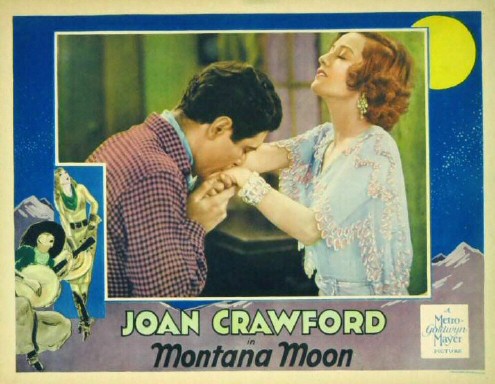
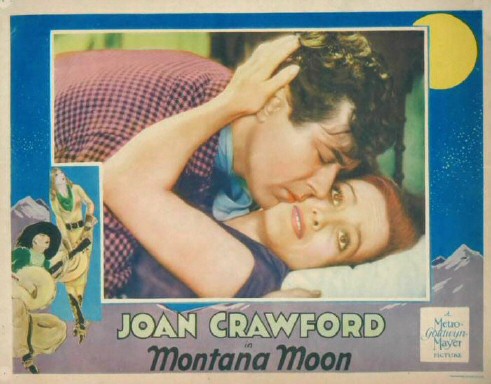

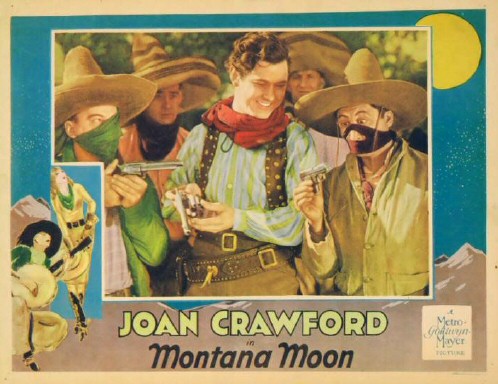
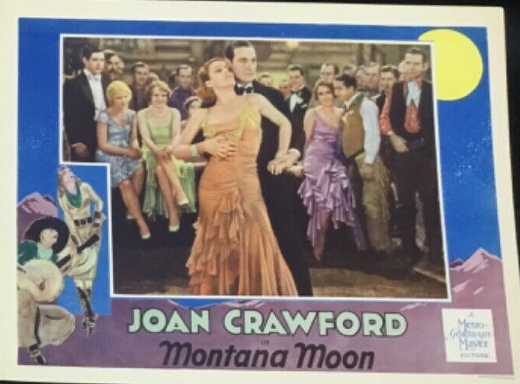



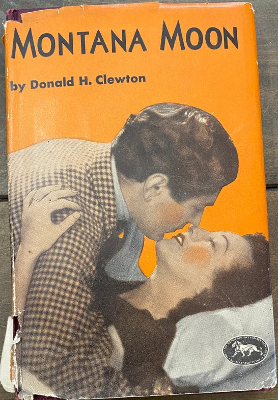
Above:
Left, two US window cards (Pennsylvania and Illinois); right, US novelization
cover (see the Books
Related to Joan Movies
page for more info) .
Below: UK and US sheet music.
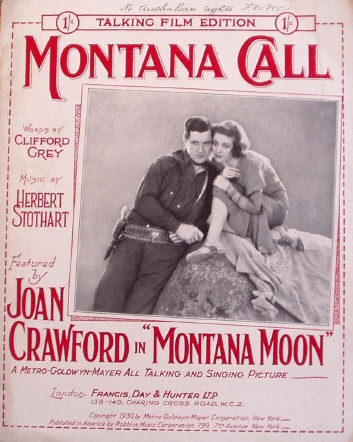


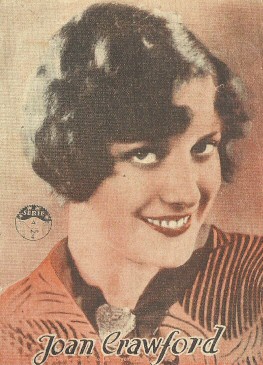
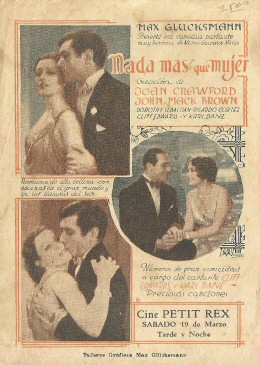
Above: A herald from Uruguay. Below: A herald from India.

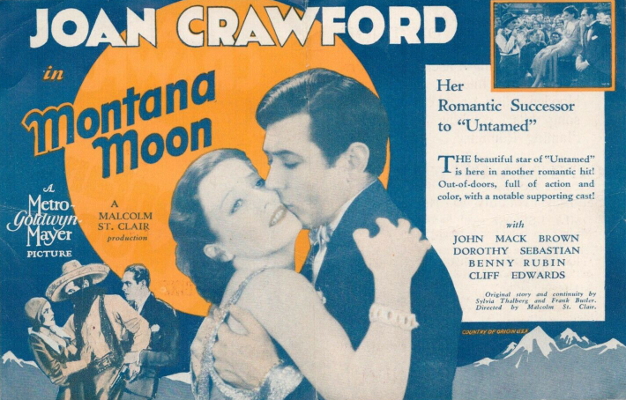
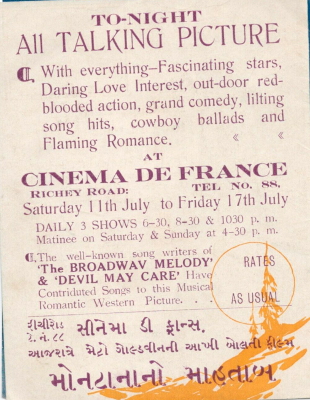
Below:
US newspaper ads (last row: all from San Francisco).
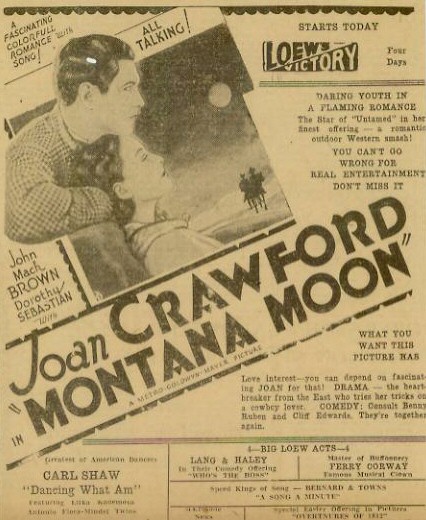

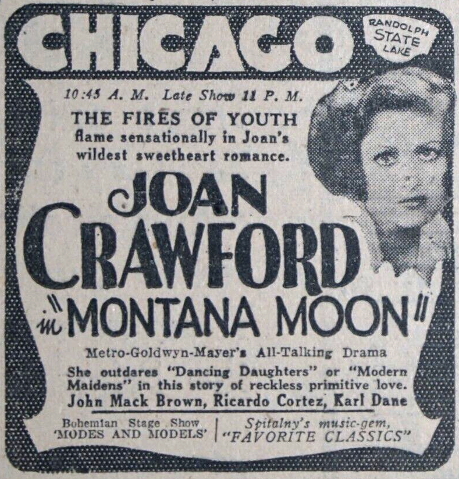
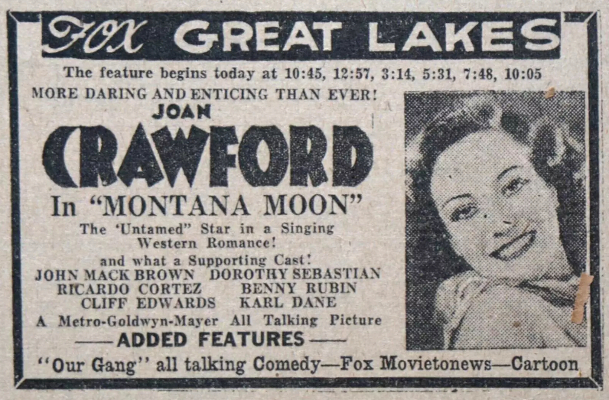



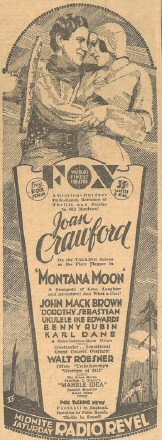

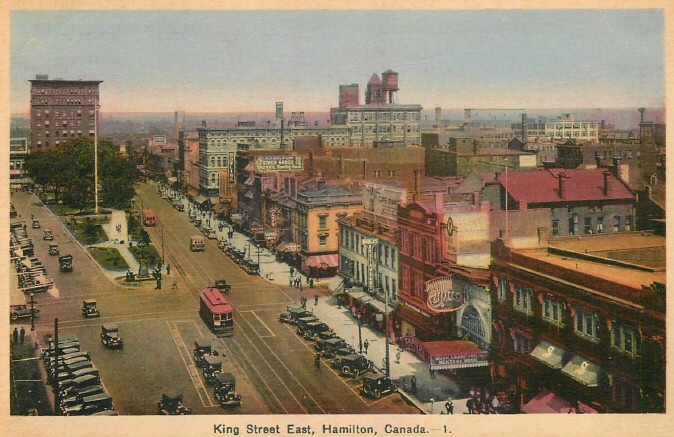
Above: Joan and "Montana Moon" on marquee of the Capitol theater (lower right) in Hamilton, Canada.
The Best of Everything